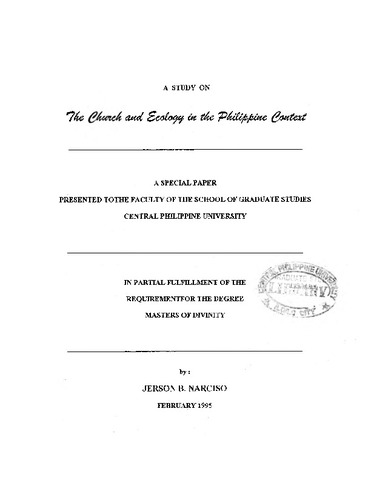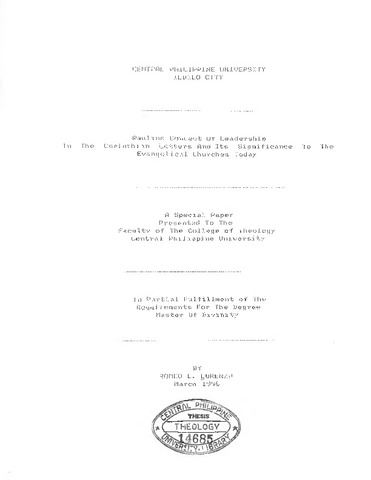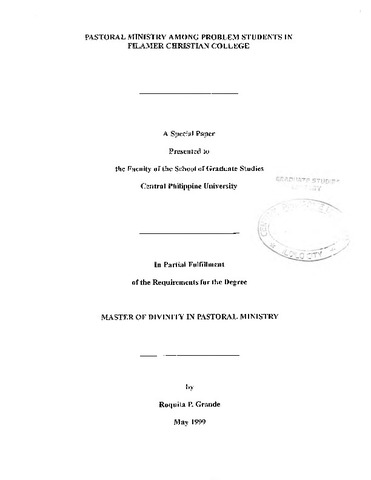Search
Now showing items 1-7 of 7
A study on the church and ecology in the Philippine context
(1995)
The problem of environmental degradation is not anymore an isolated issue. This is now a global concern. People all over the world are very much aware of the seriousness of this problem. Locally and worldwide people are ...
The relevance of Paul's missionary methods to today's Christian mission
(1994)
It cannot be denied that the missionary methods of the great missionary Paul of Tarsus in the first century are exceptional, because they resulted in the phenomenal growth of the Christian church especially in Asia. It can ...
Pauline concept of leadership in the Corinthian letters and its significance to the evangelical churches today
(1996)
Leadership is the most important ingredient in the success of any organization. This is because leadership captures concepts, visions and over-all direction.
Peter Wagner in his book, Leading Your Church To Growth, wrote: "Effective church leadership accurately perceives where the people in the congregation are now, and what their potential is for the future. The gift of leadership is the special ability that God gives to certain members of the body of Christ to set goals in accordance with God's purpose for the future, and to communicate those goals to others in such a way that they voluntarily and harmoniously work together to accomplish these goals for the glory of God."
It cannot be denied that our churches today are suffering from the problems of division, faction, pride, immorality, etc. which by nature is almost similar with those of the problems of the Corinthian church in 55 A.D. Inevitably, church split is everywhere to the extent that it does not only ruin the testimony of the church itself but above all, it ruins the ministry of God. Jesus Christ is the God of order and not of chaos, unity and not of division, love and not of hatred, peace and not of war.
With all these threatening realities, we cannot help but honestly ask ourselves questions like, is there something wrong in our church leadership? If there is, what are we going to do with it? Is there a need for us to go back to the biblical principles of leadership? What must we do with the immoral members and those who create chaos and disorder within the church?
This paper was written in the hope that it might be of help to our local churches undergoing such kind of predicament. The study centers on the Christian ministry of Paul focussing in leadership qualities which enabled him to strengthen the spiritually sick church of Corinth. In order to clarify the points discussed about his leadership, a survey is made in Paul's historical and religious background and the circumstances which led to the establishment of the Corinthian Church.
At Corinth Paul encountered several serious problems such as faction or division among leaders, pride, immorality, misuse and abuse of spiritual gifts, personal attacks, humiliation, rejection and painful criticisms from within and without the local congregation. In the midst of these perplexing events, how did Paul maintain his divinely appointed authority, assert his leadership as an apostle, deal with the problems which brought the rebellious church into repentance, and in what possible ways such approaches be significant to our local evangelical churches today are discussed in this paper.
Yes, it is true that nothing in this world is permanent. Everything changes including church leadership. In the New Testament, as time and circumstances changed, leadership in the church changed too. Leadership patterns develop according to the need. They do not remain static.
Likewise, the context of Paul's leadership in the Corinthian church had changed. Forexample,women are required by Paul to cover their heads inside the church (I Corinthians 11:5,6). The issue is cultural rather than spiritual. Paul's advice applied directly to the cultural situation in Corinth, where unruly women were disrupting the worship services.
However, in the Philippine setting it is no longer applicable because our culture does not require a woman to wear a veil or that she should always have long hair. It is our common belief that morality does not depend (on the veil or on the length of the hair. A woman may have short hair and does not cover her head yet, she is morally and spiritually upright. God does not look at the outward appearance but at the heart.
Even though the context of Paul's leadership had changed but the essentials are the same and can still be best applied to our local evangelical churches today. Therefore, this study intends to point out those essentials so that our churches will be strengthened and edified for the glory of God....
Pastoral ministry among problem students in Filamer Christian College
(1999)
The past few years have witnessed a growing concern for Pastoral Ministry through counseling. A ministry that concerns healing, sustaining, guiding and reconciling a person who is in crisis situation. Pastoral counseling ...
Case studies of two Baptist churches in conflict
(1997)
I started to work as a pastor in 1985 in a local church that was still recovering from a conflict situation. Membership then, had thinned down to more than 50%. The atmosphere of superficiality and distrust could still be ...
A study of mission method for Filipino and Korean missionaries in Iloilo
(1994)
Korean churches have grown towards maturity after celebrating their hundredth anniversary and they are sending out more and more missionaries. In terms of experience in the history of mission work, Western churches can be ...
Home visitation: A pastoral care strategy for the healing of life
(1996)
The purpose of this paper is to defend the shepherding role of the minister through pastoral visitation as something that is still relevant and necessary in church work. This is to show to other ministers that pastoral ...








